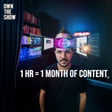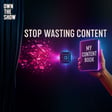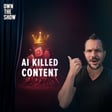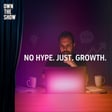
AI in Business, AI Agencies, & Writing Books with Ai #AIintheSky
In this episode of the AI-Driven Marketer, Dan Sanchez and Marc Angelos dive into the fascinating world of AI in marketing, tackle multiple AI news items and discuss its impact on marketing.
Timestamps:
00:00 AI in the sky: exploring AI's impact.
05:36 CEO should lead company-wide AI implementation.
08:38 AI transformation in marketing leads whole organization.
11:37 Building custom GPT, feeling similar to marketing ops.
13:35 Marketing professionals need to study AI integration.
17:01 AI's impact on content and book relevance.
21:54 Struggling to soundproof a studio, book disappointment.
23:32 Desire to use AI to enhance content.
28:57 Podcast to book, adapting to AI changes.
31:03 Potential danger in creating a book unnecessarily.
37:18 People prefer authentic communication over polished content.
40:07 Developing consistent, unique brand personality for success.
41:37 YouTube thumbnails must feature logo and face.
44:40 Seeking feedback on potential recurring segment format.



![What’s Your Authority Score? [The 5-Factor Test] image](https://media.zencastr.com/cdn-cgi/image/width=112,quality=85/image-files/630c9f06819f8b3dba5fa460/cfbaccba-f587-45de-a41f-e2c99c15e2a5.png)
![The Audience Growth Engine [Full Framework] image](https://media.zencastr.com/cdn-cgi/image/width=112,quality=85/image-files/630c9f06819f8b3dba5fa460/46b84fd1-e856-4687-9aee-6b4a7e0bc7ff.png)



![The "Dream 100" Execution Plan [Google Sheet System] image](https://media.zencastr.com/cdn-cgi/image/width=112,quality=85/image-files/630c9f06819f8b3dba5fa460/fcd89374-76a4-4e58-a2e3-2bb7ddda4364.png)










